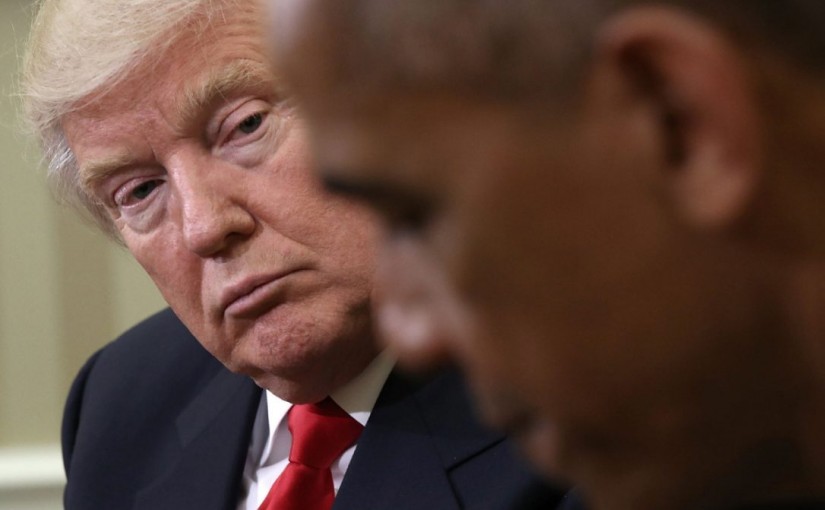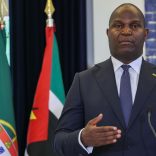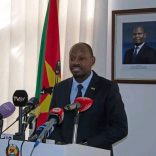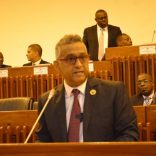Mozambique mulls asking China to rework US$1.4 billion debt after unrest hits economy
Jack of Spades: Does a Trump Presidency mean a raw deal for Africa? – By Colin Waugh

Getty / United States President Barack Obama meets with President-Elect Donald Trump in the Oval Office of the White House in Washington
This week in the United States marks the end of a long, uniquely distasteful political pantomime season and the beginning of a period of months of uncertainty and speculation for Americans and their partners, competitors and dependents around the world. For many, for decades used to a strong degree of predictability in the exercise of power by the US president and his government, international speculation focuses on which Donald Trump might emerge from the ashes of a campaign marked by high emotions and vile rhetoric from the ultimate victor.
With an already-divided US population being urged on a daily basis to behave in even more divisive fashion, spurred on by a cascade of disgraceful rhetoric from the lips of the president-elect, the world now waits to see which of his policy threats and sectarian incitements as well as his more mainstream proposals will now actually be translated into law and which might be quietly shelved amid the need for pragmatism and other priorities in government.
On this continent, many saw Barack Obama’s 2008 election as a long-awaited affirmation of the worth of African Americans and even a validation of the prospects for the black race to take their rightful place on the world stage. For many Africans here and African Americans there, the contrast with the mood in the wake of Trump’s election to the presidency could not be starker.
While Donald Trump’s overall stance towards Africa still remains hazy, several specific pledges unlikely to be helpful to the continent have already been promised: climate change has officially been dubbed a ‘hoax’ by the future occupant of the White House, and the un-funding or wholesale cancellation of climate change amelioration programs is widely feared. As Mozambique enters its storm and flood season once more, with much of the devastation of last year’s weather catastrophe as yet unrepaired the new stance from Washington DC could be just yet another blow to this struggling coastal nation in the midst of working its way out of self-inflicted financial misery.
What is known is that the new president favours greater security for ordinary Americans, physically and economically, as well as enhanced economic interests for America around the world. Whether this translates into greater investment or merely a beefing up of military hardware in strategic locations around the globe remains to be seen. Much will depend on which advisors and deputies Donald J. Trump surrounds himself with. In terms of major trading partners, the mood is protectionist, certainly, but vis-a-vis Africa it may be wait and see as scrapping relatively uncontroversial existing programs is unlikely to be a priority. But open ended aid budgets, already seen by most as yesterday’s solution for Africa, will certainly not be part of Trump’s tomorrow.
With not much time and probably even less inclination to learn about the continent, Trump may just simply take the advice of his Republican party advisors (since they are on the same side now) and just go by the manual on Africa, keeping a right wing pro-business slant to whatever is offered. Historically the cornerstone of private sector Africa support has been African Growth and Opportunity Act (AGOA), which came into effect 16 years ago, and is aimed at expanding US trade and investment with sub-Saharan Africa. Its mandate is to “stimulate economic growth, to encourage economic integration, and to facilitate sub-Saharan Africa’s integration into the global economy”
In terms of outright aid, President George W Bush brought the continent the President’s Emergency Plan for Aids Relief (PEPFAR) – which provided millions of people with drugs to help combat the ravages of HIV. Although criticized by some for its execution on faith-based principles, the program is a positive legacy of the Republican Party in Africa
For a new American president with no experience of public office, early reliance on House of Representatives Speaker Paul Ryan, a campaign critic, but particularly vice president elect Mike Pence are likely to be key influences. Both are devout Catholics and former Governor (of Indiana) Pence has called himself an ‘’evangelical catholic’’ – but Pence’s priorities may prove to be more those of a political ideologue than of a church-goer. Late last year, governor Pence clashed with the Catholic Archdiocese of Indianapolis when he halted state support for efforts to relocate refugees, citing security concerns, railing when the archdiocese defied him by welcoming a Syrian family to the city over the governor’s head.
One possible bright spot, as yet unconfirmed, will be the incoming administration’s stance towards American business in Africa. For decades, guided by the 1977 Foreign Corrupt Practices Act (FCPA), American corporations have been subject to strict rules on their behaviour with regard to incentivizing officials of host governments to treat their contract tenders favourably, as many Asian and other competitors have long been used to doing. There is no question that millions of dollars of business has been lost for the US in Africa and jobs for Americans have been forfeited in the name of this anti-corruption measure over the years.
The new president is if nothing is a businessman who knows how to get results, not always by playing according to the rules. Perhaps it would not be idle to speculate that some loosening of the FCPA or a weakening of its enforcement could become part of the new landscape on Planet Trump.
In this vein, Africans may prepare themselves for a more selective kind of engagement with Trump’s America, perhaps one which will only begin to make itself felt well into his presidency. Just as Trump the candidate was an unruly knave avowedly seeking greater self reliance at home for his own people, Africa might do well to lower its expectations from a new leader of the Free World bent on reshuffling the US foreign affairs deck in a very different way from his predecessors.
By: Colin Waugh
- Colin Waugh is a financial economist and investor and was Washington correspondent for the UK publication ‘Scotland on Sunday’ during the Clinton electoral campaign of 1992.












Leave a Reply
Be the First to Comment!
You must be logged in to post a comment.
You must be logged in to post a comment.